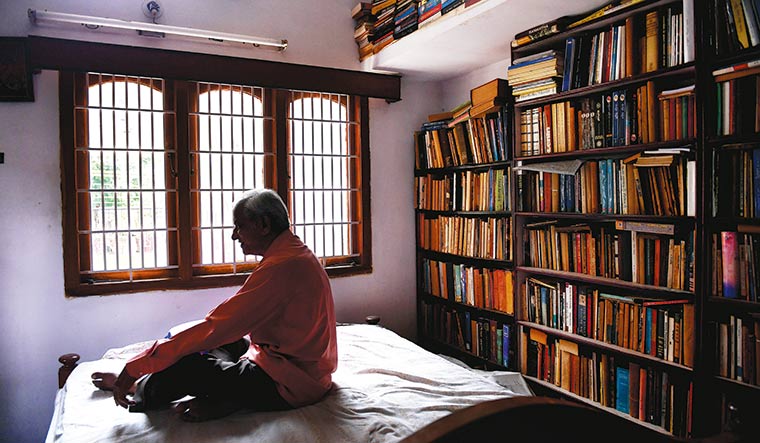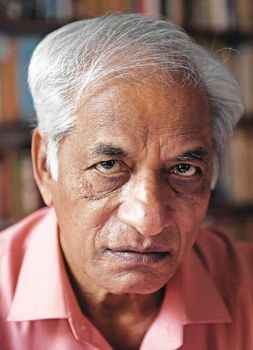RELIGIOUS FUNDAMENTALISM and bigotry are spreading at an alarming pace across India. After the 2014 Lok Sabha elections, there has been a spurt in the assertion of one’s religious supremacy.
A fallout of this perilous assertion is the serial killing of thinkers like Narendra Dabholkar (in 2013), Govind Pansare, M.M. Kalburgi and Gauri Lankesh. None of these people had violated any law, morality or the Constitution. They were people who tried to save and strengthen democracy, and create social awareness through their works. But they were murdered by ignorant and narrow-minded people who misunderstood their good intentions.
I have been writing and publishing books for the last four decades, speaking and taking part in people’s movements as I consider it to be my duty. The Constitution of India says, “It shall be the duty of every citizen of India to promote rationalism, scientific temper, reform and humanism” [article 51 A (h)]. I work as directed by the Constitution.
In 1982, I published my book Shankaracharya Mattu Pratigaami (Shankaracharya and His Reactionary Philosophy) and argued that Shankara’s philosophy was anti-people. I detailed his visit to Nagarjunakonda, where he destroyed the Buddhist monuments (Memoirs of the Archaeological Survey of India, no. 54, The Buddhist Antiquities of Nagarjunakonda by A.H. Longhurst, 1938). I made enemies with this book. I invited them to counter me with evidence, but to date no one has come forward. It is such intellectual bankruptcy that instigates people to eliminate thinkers.
In my case, people made wild allegations and issued threats to my life. These phone calls and messages stopped one and a half years ago, after the police intervened and took appropriate action. I am also thankful to the late K.S. Puttannaiah, then MLA and president, Karnataka State Farmers Association, who challenged them, saying, “I will bring Prof Bhagavan to Vidhana Soudha. You come there and kill him.”
The killers who claim to be protecting Hindu religion have no idea what it is. They think that visiting temples, celebrating festivals and performing puja is Hindu religion, for they don’t understand the essence of Hindu religion or social hierarchy. There are four varnas—Brahmin, Kshatriya, Vaishya and Shudra—and the privileges and status enjoyed by the first three are denied to Shudras as they are slaves (daasyam shudram dwijanmanaam—Manu Smriti 8. 410). According to Manu, Shudras are slaves and children of prostitutes, and cannot own any property.
Manu Smriti was written in 185 BC. If the low castes, dalits, tribals and nomads continue to live in penury, it is due to society’s adherence to Manu’s code. Surprisingly, most Indians remain mute spectators when some leaders proclaim that they will replace the Indian Constitution with the regressive Manu Smriti. What a difficult circumstance! I have spoken against such statements in public forums. In fact, Dr Ambedkar and Periyar had burnt Manu Smriti.
The Bhagavad Gita was authored on the same lines as Manu Smriti in the third century, and Krishna says he created the four varnas (Gita, 4.13). Krishna considered Shudras, women and Vaishyas as sinners (Gita, 9.32). By calling Shudras slaves and sinners, he denied them a life of dignity. But it is the hard work of Shudras that has ensured prosperity and food production in this country. So, Shudras are not sinners but blessed ones. The priestly class who are leading a luxurious life exploiting the working class are the sinners.
I have written and spoken about religion and gods only to warn the masses against exploitation in the name of gods. But some ignorant people who do not bother to read books have been misled by the Brahmanical forces to murder Gauri, Kalburgi and others.
It is now well known that there was a conspiracy to kill me. The conspirators have confessed to it before the special investigation team in the Gauri murder case.
My contention is that if people who lie are daring, people who speak truth are no less courageous. I have always written what I felt was right. The Karnataka government had extended police protection to my residence in Mysuru, installed CCTVs and deployed bodyguards, too. I am grateful to former chief minister Siddaramaiah for it, and the present chief minister H.D. Kumaraswamy and Home Minister G. Parameshwara for extending security to me.
Almost one and a half months before Gauri was killed, one of the accused, Naveen Kumar alias Hotte Manja, did a recce around my house. He has confessed that, after noticing round-the-clock police cover, he abandoned his plans to shoot me down. If not for the police protection I would not have been alive today to write this article.
After Naveen was arrested, his photograph was flashed on newspapers and television. When I went to Mylari restaurant near my house for coffee, the employees there said Naveen used to frequent the place.
I endured the suffocating and dreadful situation and grew stronger mentally. I stopped going out of my house, except for my daily walk, and kept reading and writing. I wrote an essay titled “Transcreating Shakespeare—Some Rays”, which was well appreciated by scholars.
I studied the Valmiki Ramayan and realised that the different narrations of Ramayana in Kannada and other Indian languages were part of the original story. The Kannada version has omitted several sub-stories. The Valmiki Ramayana is a poem that upholds the varna system. Contrary to popular belief, Rama rajya was not based on social equality. Rama protected the varna system—“Chaatur varnasya rakshita” (Sundarakaanda, chapter 35, shloka 11). I have elaborated on this in my latest work, Rama Mandira Yeke Beda? (Why we don’t need a Rama temple).
The Ram Janmabhoomi and Babri Masjid case will not be resolved if either of the two communities is given the disputed land; it may result in bloodbath. An ideal solution would be new legislation to declare the disputed land a national property, build there a garden of rare plants; or a hospital that will treat not only physical illnesses but also the ‘caste and religion’ disease; or a national museum of rare artefacts and manuscripts that exude India’s vibrant cultural heritage.
I dare my would-be killers, if they are not cowards, to fix a date for killing me in front of the Vidhana Soudha in the presence of the chief minister and top police officers. I will be there to face death. If they succeed they will be heroes.
K.S. Bhagavan is a rationalist, writer and retired professor of English



